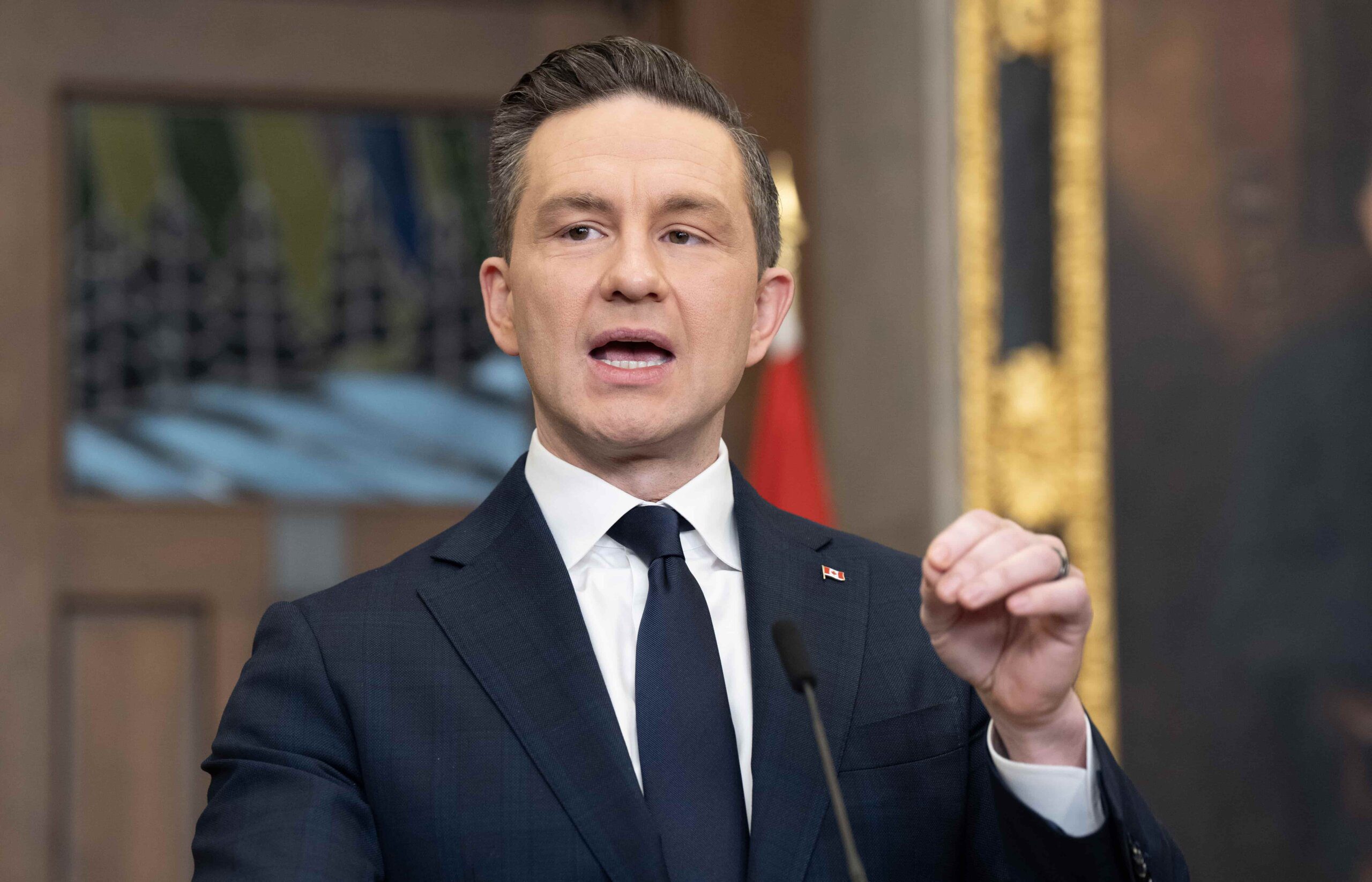When conservatives talk about families, they are [almost exclusively] talking about nuclear families: all parties cis and straight; a mother and a father; son and a daughter (if a girl child is wanted at all—ask me later about the video I watched last night on “gender disappointment” in the context of a gender reveal). All parties are imagined as traditionally masculine or feminine, as assigned. The further right-wing you go, the more stringent this gets, with implications that all family members be able-bodied, white, blond.
So when Conservative leader Pierre Poilievre sets off alarm bells about families desperate to have children whose plans have been derailed by the economy, this is who he is talking about. As most queer and trans people and our allies know, queer families do not always or often come about on the same terms as the average cishet-led family. We tend to have children older and less traditionally, involving sperm banks, surrogates and adoption. Of course, there are LGBTQ2S+ couples that can reproduce without assistance, and there are cishet couples that struggle with infertility—these things are not mutually exclusive.
The Liberals and NDP have called Poilievre out on using outdated language in reference to saying that young people are delaying having children until after their “biological clocks” have run out, due to not being able to afford homes. The parties note how that is insensitive to women with fertility issues, but I want to go a step further and suggest that no one—including parties who have claimed to be our allies—bringing up queer and trans people in this context at all is dehumanizing. We’ve been left out of the discussion entirely, even by critics; we’re just … not part of the equation, not considered at all, our families not counted.
Interestingly, a U.S. study from about five years ago suggests that income is also less of a determining factor in LGBTQ2S+ people’s decisions as to whether or not to have children. We live in a time where our rights are being targeted across the globe: trans people are losing their medical access; reproductive rights are being rolled back; surrogacy and IVF are under attack, as is the right for queer couples to adopt. Leaning into biologically essentialist language is dangerous, and we—Canadians, the media, and our political leaders—should be treating it as such.
Earlier this week, Tyee reporter Jen St. Denis wrote her own very good take on why Poilievre should knock it off, writing that “it’s important to put the language Poilievre has been using in the context of what’s been happening within the world of right-wing and conservative politics.” What is happening, in her words, are “ongoing culture wars”—which have continuously targeted marginalized communities; Diversity, Equity & Inclusion (DEI) efforts; queer and, especially, trans people. Speaking about people in “biological” terms—“biological woman” and “biological father,” for example—is very often a dog whistle for anti-queer and anti-trans sentiments. While what Poilievre is saying could be construed as “thinking about the young women,” it seems to really be about what he deems a “valid” family.
St. Denis points out that Poilievre, in conversation with none other than Jordan Peterson, has boasted about young families’ desire to “practise traditional values.”
“Young people today, they want to have families,” the Conservative leader told Peterson. I take no issue with this on its face. But people well into their 30s and 40s also want to have children; queer and trans people want to have children; single people who can not procreate in a “traditional” fashion want to have children (I say this as a queer single parent by choice).
In 2019, CBC’s Kevin Naulls wrote an article called “I’m a gay millennial and I want to be a father—but I can’t,” in which he talked about being single at 35, being saddled with student debt, high rental prices in Toronto and concerns about job security and renovictions. In other words: a mid-30s single gay man has the same concerns about economics and the price of urban living as a 20-something straight married couple, and his—and our—concerns are as valid as theirs.
A 2022 article in The Guardian (albeit not always the most sympathetic publication when it comes to our community) tells the story of a married gay male couple in New York who were in their mid-30s and trying to start a family. These issues are not solely Canadian; if anything, we often see what happens in the U.K. and U.S. come to Canada next. “We got married and then we wanted all the trappings: house, children, 401K [retirement saving plan], etc.,” one of the men says. The couple got caught in a battle with their insurance company while navigating the costs of surrogacy and fertility treatments—costs that the average young cishet couple doesn’t have to contend with from the start. In the article, the executive director of the advocacy group Men Having Babies spoke to the fact that gay men are expected to just be okay with not having children, regardless of their hopes for their families and futures. The costs, rights and restrictions associated with being “unconventional parents” in the eyes of (too much of) society—fertility treatments, surrogacy, adoption, single parenthood and egg and sperm donation—need to be part of the conversation when our federal leaders are talking about affordability and family planning for Canadians.
I am not saying all queer and trans people must want children, or that those who do are more important than those who don’t. In fact, I don’t think anyone needs to want children—I am as pro-“childless cat lady” as it comes, but I do think that LGBTQ2S+ parents and families deserve the same amount of attention, care and integrity as their cishet counterparts. I think we deserve affordable housing and groceries as much as they and their families and hypothetical or potential families do too, for that matter. I think we deserve leaders and a government that will not only preserve our rights, but advance them. Talk of “biological clocks” is wildly offensive to us; the conversation needs to change to include our realities.
With the 2025 Canadian federal election underway, Xtra is bringing back our weekly pop-up election newsletter, Rainbow Votes. Subscribe now for free exclusive reporting, analysis and opinion in your inbox every Thursday.


 Why you can trust Xtra
Why you can trust Xtra


